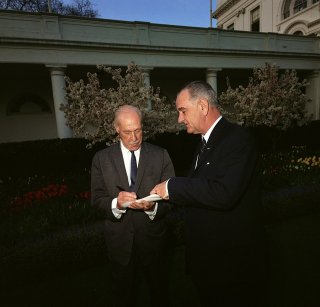The Scorpion on the Potomac: Navigating Drew Pearson’s Washington
Donald A. Ritchie’s The Columnist: Leaks, Lies, and Libel in Drew Pearson’s Washington offers a probing look at one of the most controversial journalists to ever stalk the halls of power.
Perhaps the greatest stain on Pearson’s professional record and personal honor was his flagitious persecution of Secretary of Defense James V. Forrestal. Forrestal was a brilliant military planner and organizer and a patriot who recognized the evil—and the threat—of Soviet communism as well as that of Nazi Germany, Stalin’s one-time partner in European plunder. He discerned the looming threat of the USSR long before the Iron Curtain fell over most of Eastern and Central Europe and he was a tireless voice for postwar military preparedness at a time when people like Pearson and “progressives” and fellow travelers like Henry Wallace were pitching appeasement. He was responsible, among other things, for ensuring that George F. Kennan’s 1946 “Long Telegram” was widely distributed both in the Truman administration and in Congress.
As the first secretary of defense of the newly merged departments of the U.S. Army and Navy, and the most effective voice for a sound national security policy in the Truman administration, Forrestal became Pearson’s prime target. In column after column, and broadcast after broadcast, Pearson led a sordid campaign against Forrestal, impugning his integrity, questioning his character and courage, and subjecting him to groundless slander. In later years, even his junior partner, Jack Anderson, would acknowledge that Pearson “hectored Forrestal with innuendos and false accusations,” which helped to bring on a nervous collapse and ultimately drove him to suicide.
Time magazine devoted a stinging rebuke to his calumnies:
As James V. Forrestal was buried with military honors in Arlington National Cemetery, the nation’s press reflected on the vitriolic attacks made on the nation’s first Secretary of National Defense. Commentators Drew Pearson and Walter Winchell, who had jabbed away at Forrestal for relentless months in syndicated columns and Sunday-night broadcasts, found themselves the attacked instead of the attackers. In the Pearson and Winchell assaults on Forrestal, one thing was clear: both had overstepped the bounds of decency, both had strayed far from their responsibilities as journalists.
None of which seems to have made the least impression on Pearson, a journalistic bottom feeder who had risen to the top. More surprisingly, it all seems to have been glossed over by reviewers of Richie’s flawed but worthwhile biography. Fergus Bordewich, writing in The Wall Street Journal, even went so far as to describe Pearson as a “man of intense moral force.” Showman, propagandist, inspired snoop, tireless self-promoter, and gifted character assassin, yes. But a moral force? Hogwash.
Aram Bakshian, Jr. served as an aide to presidents Nixon, Ford, and Reagan and has been widely published here and overseas on politics, history, gastronomy, and the arts.
Image: Wikimedia Commons.

